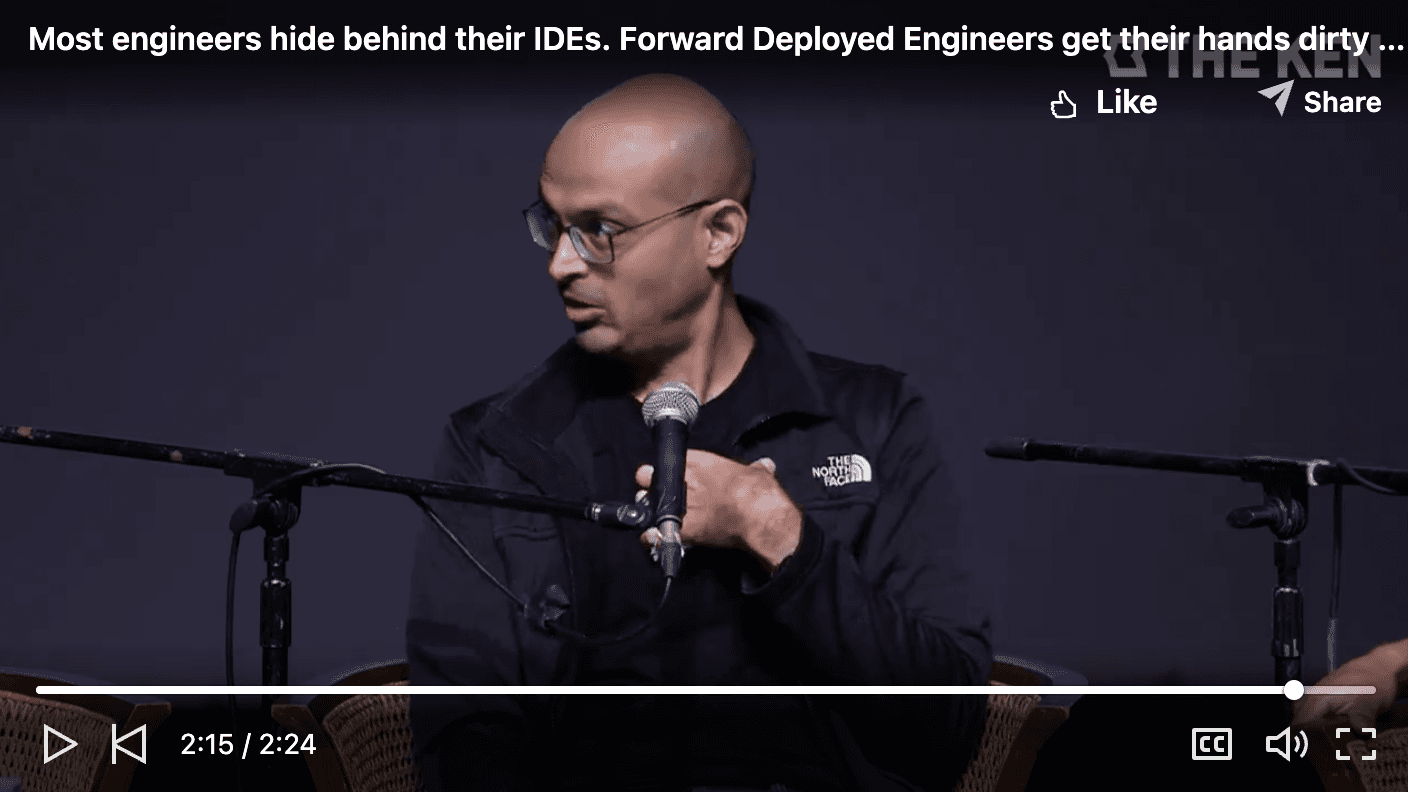The software industry has a problem. We’ve built this massive wall between engineers and the real world.
On one side, you have engineers cranking out beautiful code in pristine development environments. On the other side, you have messy business problems with legacy systems, compliance nightmares, and customers who don’t care about your elegant architecture—they just want their problems solved.
Most companies accept this divide. They hire product managers to translate between engineering and business, create detailed specs, and hope nothing gets lost in translation.
We think that’s bullshit.
Most engineers are hiding behind JIRA tickets
Here’s what happens in most tech companies: An engineer gets a JIRA ticket, implements the feature, throws it over the wall to QA, and moves on to the next task. They never talk to customers. They barely understand what the business does. They optimize for code elegance, not business outcomes.
This model worked fine when software was simpler and business requirements were stable. But in today’s AI-driven world, where requirements change daily and the most valuable solutions emerge from deep contextual understanding, this compartmentalized approach is a productivity killer.
At realfast, we’re seeing this play out in real time. When we build AI agents for Salesforce implementations, the magic isn’t in the AI itself, it’s in understanding the specific business context that makes the AI useful.
Our agents don’t just generate unit tests. They generate unit tests that understand the client’s compliance requirements, their deployment pipelines, and their risk tolerance. That level of contextual intelligence can’t be spec’d out in a JIRA ticket.
Enter the FDE
A Forward Deployed Engineer (FDE) is a hacker who codes like hell but also understands what makes businesses tick. Think hacker + suit.
Think of it as the opposite of a backend engineer who’s never talked to a user. An FDE is an engineer who talks to users first, understands their constraints and pain points, then builds solutions that actually solve real problems.
The name comes from military terminology - forward deployed troops operate on the front lines, adapting to rapidly changing conditions with limited support. Similarly, FDEs operate at the intersection of technology and business, where requirements are ambiguous and the solutions aren’t in Stack Overflow.
The Palantir Innovation & How Palantir Made It Cool Again
Palantir didn’t invent the FDE concept, they just made it cool again.
In the late 90s, the many of the famous software engineers were consultants. Not the PowerPoint-wielding type, but technical wizards who embedded with clients, understood their problems, and built solutions that actually worked. The engineers who created the foundational software we still use today? Many were consultants working Monday-Friday in client offices. Among other things, they were responsible for creating the first wiki, TDD, and the agile movement.
But consulting became associated with body shops and offshore outsourcing. Management types turned agile into Scrum, and started churning out Scrum Certifications. Suddenly, no self-respecting engineer wanted to be a consultant. It became uncool.
Palantir, like any sane enterprise/gov-tech needed engineers who could work directly with end users and build solutions for complex problems like helping intelligence agencies analyze massive datasets. Their title for this role: Forward Deployed Engineer. Same skillset as those legendary 90s consultants, but with a name that sounded tactical and cutting-edge.
For many years, Palantir was the butt of silicon valley jokes - most dismissed it as ‘merely a services company’. But the formula worked, and as Palantir’s stock price rose, their FDE strategy became cool. Suddenly, top-tier engineers were excited about customer interaction and business problem-solving again.
Why this matters more than ever
<aside>
AI is making that separation obsolete.
</aside>
Why FDEs matter now
AI is making the separation between “technical” and “business” people obsolete.
As AI agents handle routine development tasks, the most valuable engineers are those who can orchestrate context and understand what problems are worth solving. While AI can write functional code, it can’t understand the nuanced business requirements that drive complex implementations.
At realfast, this plays out daily. Our AI agents don’t just generate unit tests, they generate tests that understand client compliance requirements, deployment pipelines, and risk tolerance. That contextual intelligence can’t be spec’d out in a JIRA ticket.

Watch the video here
@ponnappa our CEO talks about why we’re hiring hackers who can code like hell but also understand what makes businesses tick.
This video is from a LinkedIn post and the video clips republished with The Ken’s permission.
What FDEs actually do
While most engineers debate whether to use tabs or spaces, FDEs are talking to customers and debugging production systems to understand why their solutions are failing in real customer environments.
You might prototype a new capability based on customer feedback, refactor core systems to handle edge cases nobody thought of, or interview potential customers to figure out what problems are actually worth solving.
The stack? Whatever works best for the customer. Frontend, backend, data pipelines, AI models, because when you’re solving real problems, nobody cares about your technology preferences.
The FDE mindset
Most engineers optimize for technical elegance. FDEs optimize for business outcomes.
This doesn’t mean cutting corners or writing bad code. It means making smart trade-offs between perfect code and shipping fast. It means understanding that a hacky solution that solves a real problem is infinitely more valuable than beautiful code that nobody uses.
The best FDEs have what we call “business taste”, they can look at a problem and quickly identify which aspects actually matter to the customer and which are just technical complexity for its own sake.
For example, when building AI agents for unit testing, a traditional engineer might focus on generating tests with perfect code coverage. An FDE would ask: “What testing approaches actually prevent production bugs for this specific client?” The answer might be fewer tests but better integration with their CI/CD pipeline, or tests that focus on their most business-critical workflows.
Why most engineers can’t handle ambiguity
Most engineering roles have clear boundaries and fast feedback loops. You own a service, implement features, respond to alerts. Success is measured in uptime and velocity.
FDE work is messier. Requirements aren’t fully specified, success metrics are business outcomes that take months to measure, and you can’t wait for detailed specs.
This requires tolerance for ambiguity, business intuition about how companies make money, communication skills with non-technical stakeholders, and systems thinking beyond individual features.
Most engineers haven’t developed these skills because they haven’t needed to. But as AI automates routine development work, these meta-skills become the differentiator.
The AI amplification effect
Here’s what makes FDE roles especially powerful right now: AI amplifies everything.
If you’re a traditional engineer using AI tools, you might get a 2x productivity boost on coding tasks. But if you’re an FDE who understands the business context, AI can make you 10x more effective at solving the right problems.
At realfast, our FDEs use AI agents to handle routine implementation work, freeing them up to focus on higher-level problems like:
-
Designing agent workflows that integrate seamlessly with client business processes
-
Building evaluation frameworks that measure agent performance on real business metrics
-
Identifying new automation opportunities by observing client workflows
The AI handles the repetitive coding work, while the FDE focuses on context orchestration and strategic problem-solving.
Why realfast needs FDEs
Here’s the thing about building AI agents for enterprise workflows: the technical implementation is often the easy part. The hard part is understanding the contextual factors that make the difference between demos and real business outcomes.
Sure, we could build an AI that generates syntactically correct unit tests. But clients need agents that understand their specific deployment patterns, compliance requirements, and risk tolerance. This contextual intelligence can’t be captured in product requirements—it emerges from spending time in client environments.
That’s why we’re building around the FDE model. Our FDEs embed with implementation teams, prototype solutions based on real observations, deploy them in production, and own the success metrics. You don’t hand off your work, you own the entire lifecycle from problem identification to production outcomes.
We’re looking for hackers who can code like hell but also understand what makes businesses tick. You need 2-5 years of engineering experience and polyglot skills, but more importantly, genuine curiosity about how businesses make money and communication skills to work directly with stakeholders.
Forward Deployed Engineer - realfast - Apply now!
The realfast difference? You’re taking the latest AI research and turning it into production software that drives measurable business outcomes.
Let’s be clear about what this isn’t
Let’s be clear about what this role isn’t, because we’ve seen too many engineers get excited about the wrong aspects:
-
This isn’t a traditional consulting role. You’re not implementing solutions designed by someone else. You’re identifying problems and building solutions from scratch.
-
This isn’t a customer success role. While you’ll work closely with customers, you’re there as a technical problem-solver, not a relationship manager.
-
This isn’t a research role. While you’ll work with cutting-edge AI, everything you build needs to solve real business problems for real customers.
-
This isn’t a traditional product role. You won’t have PMs writing specs for you. You’ll need to understand customer problems and translate them into technical solutions yourself.
The future belongs to context orchestrators
We believe FDEs represent the future of software engineering, and realfast is the perfect place to pioneer this approach in the AI era.
As AI agents handle more routine development tasks, the most valuable engineers will be those who can bridge the gap between technology and business value. While our competitors are still throwing engineers at well-defined tickets, we’re deploying FDEs who can identify opportunities, build solutions, and measure impact across the entire business stack.
Our FDEs don’t just build AI agents, they build AI agents that own specific business metrics and deliver measurable outcomes. They work at the intersection of cutting-edge AI research and real-world enterprise problems, turning breakthrough technology into production systems that drive business value.
If you’re an engineer who’s excited about working at this intersection, who wants to use cutting-edge AI to solve real business problems rather than just writing code, we should talk.
Because the future belongs to engineers who don’t just build software, but orchestrate outcomes.

